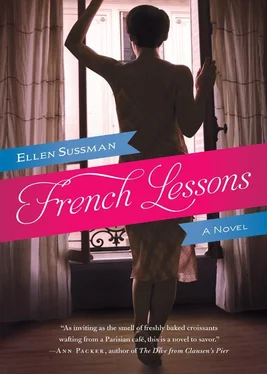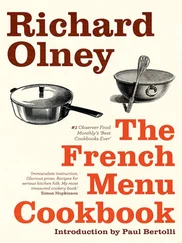“I said no. I don’t want to get arrested for what I’m going to do to you tonight.”
“She’ll never know.”
“She’ll know. The whole world will know.”
Josie was never loud in bed. She once bit the neck of a boyfriend in college. Better that than scream. She liked sex-it was a kind of game, a kind of athleticism that she was good at. But she didn’t know what it was to give herself to someone, to abandon herself, to take someone in.
That night she made enough noise for the woman to ask Simon in the morning: “Was everything all right in there?”
“Fine,” Simon said. “Everything was perfect.”
“How did you know?” she asked Simon weeks later. “That first time. How did you know what would happen when we made love that night?”
“I couldn’t stop trembling,” he said. “All through dinner. While we drove to the cabin. My body was electrified. I had never felt anything like it.”
“That never happened to you before?” Josie asked.
“You never happened to me before.”
Josie and Nico feast on mussels and fries. They lick their fingers, they toss shells into the bowl, they sop sauce with the hearty crusts of bread. When they are done the waitress brings a tangy green salad and a cheese plate, and more bread, this time filled with walnuts and cranberries.
Nico tells Josie about his childhood in Normandy, on a small farm, how once he got drunk on Calvados and fell asleep in the root cellar until morning. When he woke up he saw the police were everywhere, combing the grounds of the house, talking to neighbors, leading dogs into the woods.
He hid for a day, and at night he sneaked out and back into the woods. He wandered home minutes later and his parents rushed to embrace him.
“Where were you? What happened? Did someone take you?” they asked.
“I don’t know,” he said.
They determined that he had blocked out some terrible memory and for years after that, his parents, his friends, the neighbors, all treated him as if he carried some dark secret within him. His secret was his shame, that he had fallen asleep in a dark corner and that he had caused so much commotion over nothing.
“Did you ever tell them?” Josie asks. “Wouldn’t they now rather know that nothing bad happened to you?”
Nico shakes his head. “I’ve written a series of poems about that night,” he says. “Eventually they’ll read the poems. But even then, there’s no true story. I can’t undo the lie.”
They eat three kinds of cheeses-a runny, pungent Camembert, an aged chèvre that tastes like the earth, and a Roquefort that reminds Josie of her father, a man who eats bland food and sprinkles his salad with blue cheese.
“Our parents don’t know us,” Josie says. “They can’t know us. We hide ourselves from them. Once they knew everything about us and in order to escape them we keep our secrets, our private selves.”
“Did you escape your parents?” Nico asks.
“I had to. I was desperate to. They wanted me to go to San Jose State College and live at home. But I wanted to be a continent away from them. I thought they were old-fashioned and uneducated and- quelle horreur! I wanted to be a French girl! I wanted to be a sophisticate! I went to NYU and a year later my mother got sick. I should have stayed closer to home. I should have taken care of her that year. My father needed me.”
“You couldn’t have saved her.”
“No, but I could have saved my father.”
“I doubt it, Josie. You might have helped the burden, but you wouldn’t have made a bit of difference when it came to what he lost.”
Josie looks at him, surprised.
“How do you know?”
“I’m listening to you. I’m imagining your life.”
“But it’s more than that. How do you know about grief?”
“I don’t know,” Nico says. “My parents are alive. I’ve never lost someone I loved. I just think I know about you.”
“Is that because we’re strangers? I can tell you about Simon and you can tell me about your night in the cellar. We’ll disappear. It doesn’t mean anything. It’s like talking to a stranger on a plane.”
“No. I’m right here. I’m listening to everything you’re saying.”
Josie looks around the restaurant. For a long time, the noise of other people’s conversations had faded, along with the clang of silverware, the soft music of a violin concerto. She had lost the world and found Nico-not a lover, not even a boyfriend for a night or two, but someone to talk to.
“Thank you,” she says.
“Don’t think I do this for all my students,” he tells her, smiling.
“You haven’t even corrected my French.”
“Your French is perfect.”
“Now you’re lying. Let’s not tell any lies today.”
“Then you should make your vowels more precise. They tend to float between consonants.”
“Really?”
“I wouldn’t lie.”
“All these years I’ve been speaking French with floating vowels?”
“You had no one to show you the way.”
Josie looks down, suddenly shy. He is smitten and she will leave him. She’s just promised that she won’t lie. And yet there is a lie in everything they share today. Because she won’t go to Provence with him. It’s another Josie who could catch the next train and curl up in a couchette with this blue-eyed Frenchman. This Josie-the one who lost Simon and quit her job, lied to her father, flew to France by herself-this Josie isn’t capable of anything more than a day with a French tutor.
But she has finally eaten a meal and had a conversation.
“I won’t ask for my money back from the school,” she tells Nico. “You’ve taught me something after all.”
“We’re not done,” he tells her.
Simon called her at school though she had told him not to. She could no longer focus on her work. She whispered into her cell phone, “I can’t talk. I have class in two minutes.”
“Meet me at the lake,” he whispered back. “At four.”
“I can’t,” she told him. “I have advisory.”
“Cancel it,” he said, and he hung up, so sure he was in the knowledge that she’d risk her job to see him. She canceled her meeting. She had canceled so many meetings, she had cut out of soccer practice even though she was supposed to be the assistant coach, and she had told the senior drama class that they should prepare their one-act plays on their own and that she’d step in to supervise in the final week. After three years as star teacher she was suddenly the slacker, the fuckup. She kept telling herself that she’d make up for it-this affair can’t go on forever-and besides, she needed Simon more than she needed this job. There are other jobs.
She met him at the lake where they first started their affair, an hour’s drive from the school. They’d been back a few times and Simon always asked for the same cabin. It was unseasonably cold and no one was renting these shacks, so the nasty woman who ran the place should have been happy to get their money. Instead, though, she asked Simon the same question every time. “Is that your daughter?”
Josie had never stepped into the office, had never seen the woman face-to-face, but she always felt the woman’s eyes on her back as they rushed into the cabin moments later.
“One of these days I’ll take you for a grown-up haircut,” Simon said. “I’ll buy you high-heeled shoes and we’ll toss those silly red things in the lake. I’ll buy you a cashmere sweater and wool slacks.”
“And then you’d lose interest in me,” Josie said. “I’d look like all the women you know. Your wife and your wife’s friends. Your business associates.”
“My wife-”
“I’m sorry,” Josie said. The unspoken rule. The unspoken wife. Off limits. Keep her out of the bedroom, the cabin, the motel room, off the futon in the middle of the field.
Читать дальше












